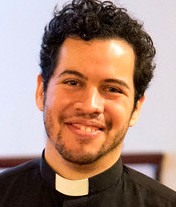Luke 15:1-10
I’ve been paying close attention to graffiti lately. One did catch my eye, … a small heart etched on the wall, and a message within that heart, “You are tolerated,” it read….
Sermons by The Rev. Javier Almendárez-Bautista (Page 10)
The Rev. Javier Almendárez-Bautista reflects on Jesus’s message about how the sabbath guides our relationship with God and the work we do (Luke 13:10-17): “The sabbath was made for humankind, not humankind for sabbath. The root of the command is to create the space for relationship with God and our neighbors; the nature of God’s work among us is to free us for meaningful rest and for meaningful work.”
Luke 10:38-42
My mother had a curious habit when I first went off to college. My brother and sister lived at home during their first years of college and commuted to a nearby university, as is common practice in my country of origin, El Salvador. Far as I was—a 3-hour car ride, from Portland to Seattle; an impossible distance, from my mother’s point of view!—she was reasonably concerned for my well-being. And every time we spoke on the phone, I always knew that my mother’s first question would always be the same: “What did you have to eat today?” ….
The Rev. Javier Almendárez-Bautista: “Can you imagine a love so grand that it would offend you, a grace so magnanimous that it would enrage you, a mercy so thorough that it would cause you to walk out these doors? That’s the kind of love with which Jesus loves you? That is the kind of love with which Jesus loves them, whomever they may be.”
St. Ambrose once asked a simple question: “What is the first commandment of the law?” One might naturally turn to the first law of the Ten Commandments. St. Ambrose, however, turned to the beginning of the Law of Moses in the Book of Deuteronomy 6:4: “Hear, O Israel: The Lord thy God, the Lord is one.” “Hear, O Israel,” is the first command, St. Ambrose says, not speak. A fitting word for clergy.
Acts 2:1-21, John 14:8-17, 25-27
I’m going to let you in on a little secret…. Every Pentecost Sunday, at least one person walks up to me just before church begins, brow furrowed with concern. This person is often one of the readers for today and are looking down at their bulletin, mouthing out words: Parthians, Medes, Elamites, Mesopotamia, Judea, and Cappadocia, Pontus, Phrygia, and Pamphilia. How am I supposed to say these words? The secret … is simple. If you say it with confidence, no one will know the difference…
John 5:1-9
Javier reflects on the Gospel reading, where Jesus heals a man who has been an invalid for 38 years.
Luke 24:1-12
Javier discusses his visit to Jerusalem’s Holy Sepulcher and the feeling of being perplexed that Jesus’ message is sometimes not what we expect.
Philippians 3:4b-14
In 2009, a young musician stood before the cream of the crop of the political establishment and announced he was working on a concept album. An album, he noted, of someone whose life embodied hip-hop, Treasury Secretary Alexander Hamilton. That artist, of course was, Lin-Manuel Miranda, then only 29 years old. And the vennue was the White House during one of President Obama’s first famous poetry jams.
The Rev. Javier Almendárez-Bautista reflects on Luke 9:28-36 (The Transfiguration): “What we call productivity is in reality the noise we make to prove to people that we are worthwhile… I hope that we will make room for being, just being, in a culture obsessed with busyness. I hope that—come what may—Christ may visit us on a lone mountain top and that he may walk down with us, wherever the road may lead.”


